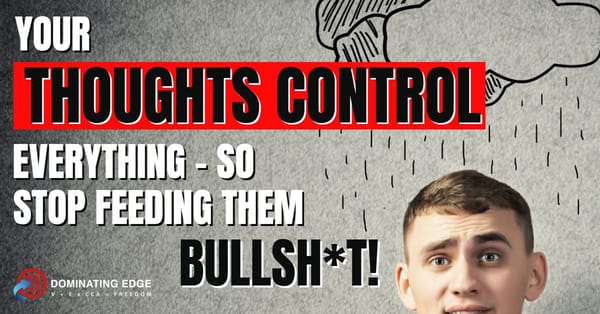12 MONEY HABITS THAT ARE KEEPING YOU STUCK AND KEEPING YOU BROKE
12 habits that could be keeping you in the same place financially - and how to break free.

Jeff Hammer, Mindset Architect DominatingEdge.com / WealthWarriors.vip
Money habits shape our financial reality. If you’re feeling stuck or constantly broke, it’s time to examine the daily choices that might be sabotaging your financial success. Here are 12 habits that could be keeping you in the same place financially - and how to break free.
1. Living Beyond Your Means
When your expenses consistently outpace your income, financial progress becomes impossible. Overspending on luxuries or lifestyle upgrades can trap you in a cycle of debt.
Solution: Create a budget that prioritizes necessities and savings. Start by tracking all your expenses for a month to see where your money is going. Once you know your spending habits, allocate your income to essentials, savings, and a small discretionary fund. Avoid unnecessary expenses, and focus on living within - or below - your means.
2. Ignoring Financial Goals
Without clear objectives, it’s easy to lose sight of where your money should go. Drifting without a plan can leave you stuck in a cycle of poor money management.
Solution: Set SMART (Specific, Measurable, Achievable, Relevant, Time-bound) goals, such as saving for a home, paying off debt, or retiring comfortably. Write down your goals and break them into smaller, actionable steps. For example, if you want to save $5,000 in a year, aim to set aside $96 each week. Regularly review your progress and adjust as needed.
3. Failing to Track Spending
Not knowing where your money goes each month can leave you stuck in the same financial struggles. Small, unnoticed expenses add up quickly.
Solution: Use tools like Mint, PocketGuard, or a simple notebook to monitor your spending and identify areas to cut back. Apps like Mint and PocketGuard can automatically categorize your transactions, giving you a clear picture of where your money goes each month. If you prefer a more hands-on approach, jotting down every expense in a notebook can help you stay mindful of your spending habits. The key is consistency - review your spending regularly to uncover trends, spot unnecessary expenses, and make informed adjustments to your budget.
4. Overusing Credit Cards
Relying on credit cards for everyday purchases can lead to high-interest debt that’s difficult to escape.
Solution: Use credit cards only for planned expenses you can pay off in full each month. Set a spending limit that aligns with your budget and use credit responsibly to build your credit score. Consider switching to a cash-only system for discretionary spending to keep yourself accountable.
5. Neglecting an Emergency Fund
Emergencies happen, and without a financial cushion, you’re likely to rely on credit cards or loans, deepening your financial struggles.
Solution: Aim to save at least 3–6 months’ worth of living expenses in a dedicated emergency fund. Start small by saving a portion of each paycheck, even if it’s just $20. Automate your savings to ensure consistency and store the money in a high-yield savings account for easy access and growth.
6. Impulse Spending
Buying on a whim - whether it’s a sale item or a luxury purchase - can keep you from reaching your financial goals.
Solution: Follow the “24-hour rule” for non-essential purchases. Pause, reflect, and determine if the item aligns with your priorities. Consider creating a wish list for items you want but don’t need immediately. Review your list monthly to decide if those purchases are still important.
7. Avoiding Investments
Letting your money sit idle in a low-interest account keeps you from growing your wealth. Inflation further erodes your purchasing power over time.
Solution: Start investing in Bitcoin, index funds, retirement accounts, or other options to take advantage of compound interest. If you’re unsure where to start, consult a financial advisor or use robo-advisors like Betterment or Wealthfront. Even small investments over time can grow significantly.
8. Delaying Debt Repayment
Allowing debt to linger keeps you tied to interest payments that eat away at your financial freedom.
Solution: Focus on paying off high-interest debt first, using strategies like the avalanche (paying off the highest interest rate first) or snowball (starting with the smallest balance) method. Make extra payments whenever possible, and avoid accumulating new debt while repaying existing balances.
9. Giving in to Lifestyle Inflation
When your income increases, it’s tempting to upgrade your lifestyle. But spending more as you earn more keeps you stuck in the same financial position.
Solution: Maintain your current lifestyle and funnel extra income into savings, investments, or debt repayment. Celebrate raises or bonuses by putting a percentage into your long-term financial goals before considering splurges.
10. Procrastinating on Financial Planning
Putting off important financial decisions, like creating a budget or planning for retirement, delays progress and leaves you vulnerable to setbacks.
Solution: Take immediate action on your financial goals. Start with one task, such as creating a monthly budget or opening a retirement account. Break larger goals into smaller, manageable steps, and set deadlines to keep yourself accountable.
11. Not Negotiating
Whether it’s your salary, rent, or bills, failing to negotiate means you’re likely leaving money on the table.
Solution: Research market rates and confidently negotiate for better deals. Practice your negotiation skills by role-playing with a friend or mentor. When negotiating, highlight your value and come prepared with data to support your case. Remember, the worst outcome is a simple “no.”
12. Keeping Up With the Joneses
Trying to match others’ lifestyles, especially when it’s beyond your financial capacity, leads to overspending and unnecessary stress.
Solution: Focus on your own financial journey. Create a vision board for your personal goals and remind yourself of what truly matters to you. Limit exposure to social media if it triggers unhealthy comparisons, and celebrate your own progress, no matter how small.
Break Free from Financial Stagnation
Breaking out of the habits that keep you stuck and broke requires self-awareness and discipline. Start by addressing one habit at a time. With consistent effort, you can shift your financial trajectory and build a future of abundance and freedom.
What’s one habit you’ll change today? Share your thoughts in the comments below!
#MoneyHabits #PersonalFinance #BudgetingTips #FinancialFreedom #RealWealth #StopLivingPaycheckToPaycheck #MoneyMindset #InvestingForBeginners #DebtFreeJourney #FinancialPlanning




